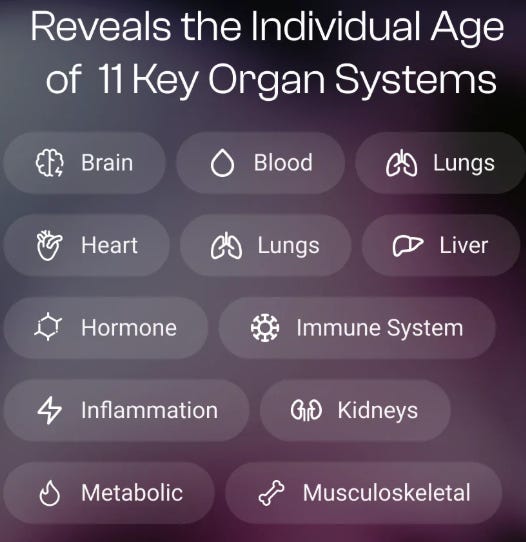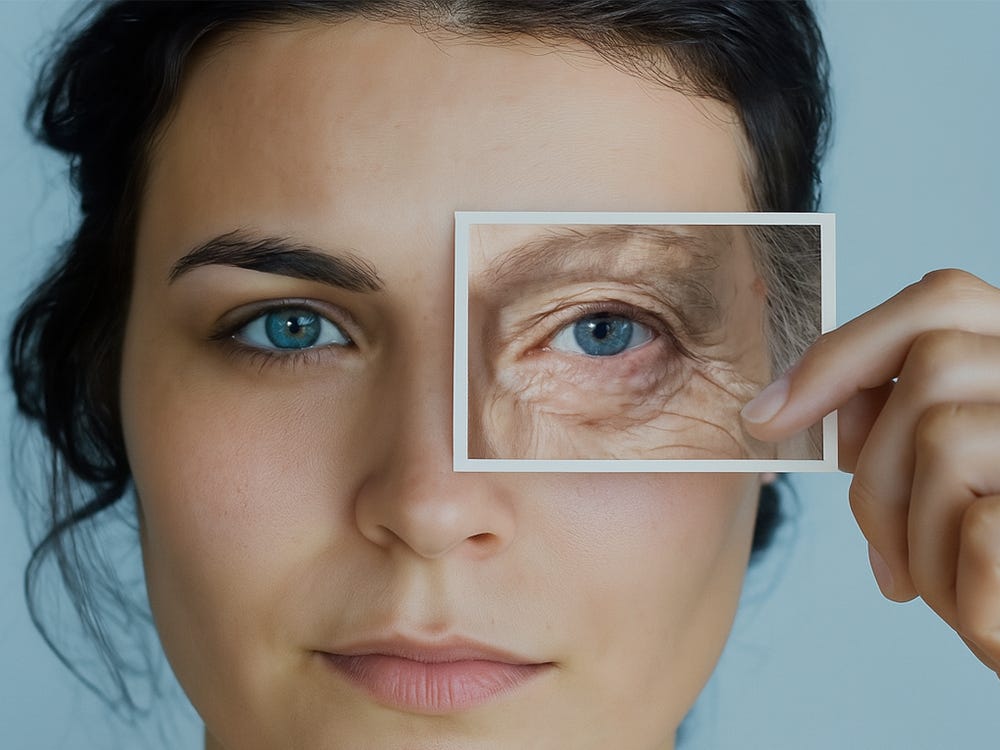Do you want to know your real biological age ?
Chronological age is just a number. Your biological age tells the real story of how your body is doing, and it's a powerful tool for optimizing health and longevity.
👋 Why Biological Age Matters
You’ve got two ages:
🪪 The one on your ID
🧬 The one your body actually feels.
That second one is your biological age, shaped by stress, sleep, food, exercise, and even your relationships.
It reveals how fast (or slow) you're really aging.
If it’s higher than your real age, your body might be breaking down faster than it should, raising your risk for disease, fatigue, brain fog, and more.
The good news? You can track it, and even reverse it.
🧪 Option 1: Real Epigenetic Testing (Most Precise)
How old are your cells, really?
TruAge is the most advanced test available to measure your body’s true biological age. It analyzes 900,000+ DNA methylation markers: the gold standard used in longevity research at Harvard, Yale, and Duke.
This isn’t just one number, it’s a full breakdown of your body’s internal age.

🔍 What You’ll Learn:
✅ Biological Age (OMICmAge) How old your body really is
✅ Pace of Aging (DunedinPACE) How fast you’re aging right now
✅ Organ-Specific Ages (SYMPHONYAge) Age scores for 11 key systems
✅ Telomeres, inflammation, NAD+, toxins
✅ Visual, personalized report to guide your next steps

🧪 How It Works
Order online, no doctor visit
Collect your sample at home (saliva or blood)
Get your report in just a few weeks
📬 Delivered securely with expert tips to slow aging.
👉 Order TruAge Test (Official Website)
Catch silent risks
BEFORE they turn into disease
✅ Pros:
Most accurate aging test on the market
Full-body breakdown for real optimization
Backed by top-tier science
❌ Cons:
~$400
2–3 week wait for results
💻 Option 2: Free Online Calculators (Surprisingly Useful)
If you’re just starting out, you can estimate your biological age online, no kit or lab needed.
Sites like biologicalagecalculator.org use phenotypic age models. These are based on real clinical biomarkers like blood pressure, inflammation (CRP), blood sugar, cholesterol, and organ function.
You’ll input basic data, age, sex, height, weight, and if you have recent blood test results, even better. These boost the tool’s accuracy significantly.
While it won’t give you methylation-level precision, it’s surprisingly good at estimating how your body is doing based on what you’ve already got on hand.
Pros:
100% free
Takes less than 5 minutes
Mobile-friendly, no download required
Great for regular tracking between labs
Cons:
Only as accurate as the data you provide
Doesn’t show system-by-system aging
Misses deeper factors like cellular repair, toxins, or genetic expression
🧍♂️ Option 3: At-Home Physical Tests (Totally Free)
Your body gives clues about its biological age if you know what to look for.
These physical tests have been studied in thousands of adults and consistently correlate with faster or slower aging. They don’t require equipment or apps, just a bit of space and attention.
Here’s how to do them:
🦵 Balance Test
Stand barefoot on one leg, eyes closed.
If you can’t hold for 30 seconds, this may reflect neurological and muscular aging. Poor balance increases fall risk and is tied to higher all-cause mortality.
✊ Grip Strength
Try a grip strength tool (about $15 online) or squeeze a bathroom scale.
A weaker grip is strongly linked to lower resilience, frailty, and accelerated aging.
📏 Waist-to-Height Ratio
Measure your waist at the navel, divide by height.
Over 0.5 indicates visceral fat and higher metabolic aging risk — even if BMI is normal.
❤️ Resting Heart Rate
Count your pulse first thing in the morning.
Under 60 bpm is excellent. Over 80 bpm can signal stress, inflammation, or low fitness.
🚶♂️ Walking Speed
Measure how long it takes to walk 10 meters at your normal pace.
Consistently slow walkers (especially past 50) often show faster biological aging, even when other signs are subtle.
Pros:
Free and fast
Great for frequent tracking
Based on well-validated research
Helps you stay aware of decline before it shows up in labs
Cons:
Doesn’t capture internal markers (like inflammation or nutrient status)
Can vary day to day with stress or fatigue
📊 Biological Age Testing Comparison
❓ FAQ: Biological Age Testing
🧬 How is biological age different from chronological age?
Your chronological age counts birthdays. Your biological age reflects how well your body is functioning. Think of it like the difference between miles on a car and how well it runs. Some 60-year-olds test biologically at 45 — others at 75.
🔬 How accurate are these tests?
Epigenetic tests (like TruAge) are currently the most accurate. They’re based on over a decade of peer-reviewed science and are used in human longevity research.
Online calculators are less precise but still useful if you track consistently.
Physical tests reflect mobility, strength, and cardiovascular health — rough but helpful.
🧪 Is an epigenetic test clinically valid?
Yes. It’s used in clinical trials and aging studies by Harvard, Yale, Duke, and others. It’s built on published science and gives in-depth insight across organ systems and pace of aging.
📦 Do I need to visit a lab to get tested?
Nope. TruAge sends you a test kit by mail. You collect your sample (saliva or blood) at home and send it back. The results are delivered online, with clear visuals and interpretation.
📉 What if my biological age is older than my real age?
That’s a signal, not a sentence. It means your body may be under higher stress or damage. Most people can reverse 2–5 years of biological age with the right health changes in under 12 months.
⏱️ How often should I test?
Lab tests: every 12 months to track meaningful change.
Free calculators or physical tests: monthly or quarterly is great for pattern spotting.
💡 What improves biological age the fastest?
Sleep, exercise (especially strength + walking), stress reduction, fasting, fiber-rich foods, and quality proteins all make a big impact. Even walking 15 mins daily can shift markers over time.
🍽️ Do supplements work?
Some, like omega-3s, vitamin D, and NMN/NAD+, show promise. But lifestyle factors are way more powerful overall. Supplements are best used to fill gaps, not as a shortcut.
👀 Can I rely only on DIY tests?
They’re great for awareness, but they won’t show what’s happening inside your body. If you're over 35 or optimizing long-term health, add blood panels or methylation data for a fuller picture.
⚖️ Should I compare my results with others?
Not really. Biological age is personal, influenced by genes, habits, and history. Use your past scores as your baseline, and focus on your trend, not your neighbor’s.
🧬 Aging is inevitable.
How you age?
That’s where you take control.
Take the TruAge Test Now
📚 Sources:
Gauging biological age to predict future health - NIH 2025
Progress in biological age research - NIH 2023
If this helped, share it with someone who’s curious about their real age.







